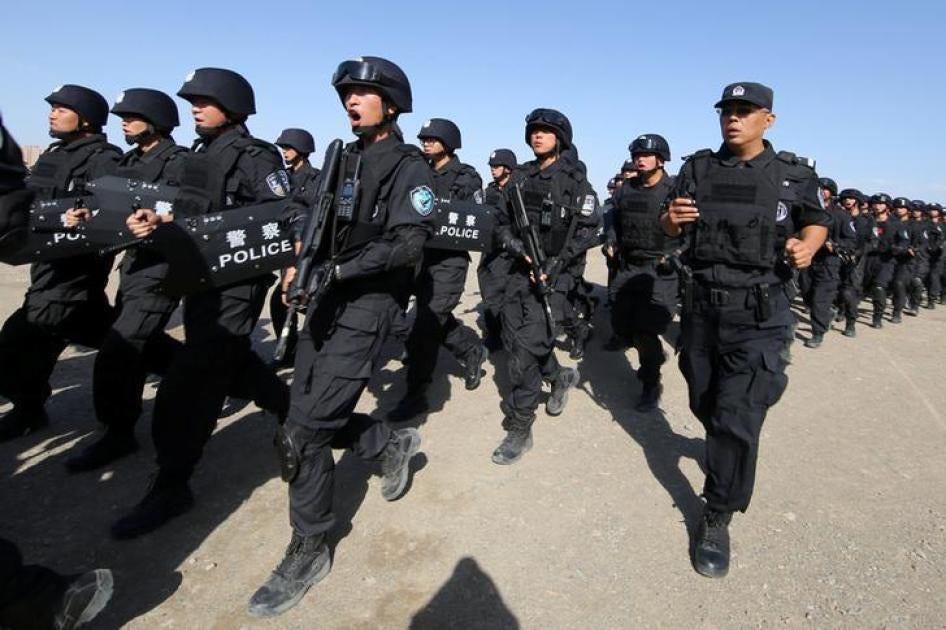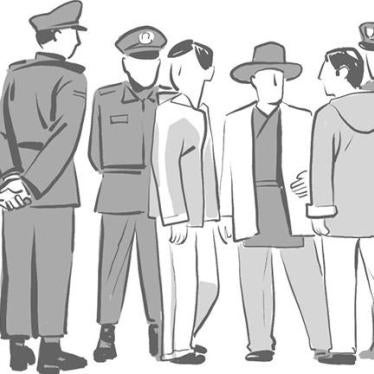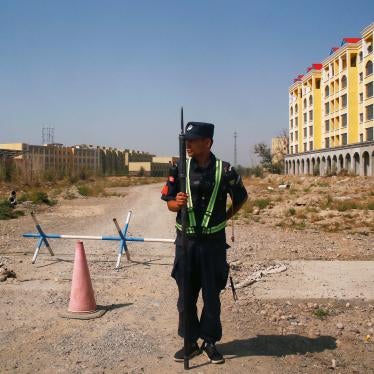(New York) – The Chinese government should immediately free people held in unlawful “political education” centers in Xinjiang and shut them down, Human Rights Watch said today. Since about April 2017, the authorities have forcibly detained thousands of Uyghurs and other Turkic Muslim minorities at these centers, where they are subjected to propaganda promoting Chinese identity.
“The Chinese authorities are holding people at these ‘political education’ centers not because they have committed any crimes, but because they deem them politically unreliable,” said Sophie Richardson, China director at Human Rights Watch. “The government has provided no credible reasons for holding these people and should free them immediately.”
Human Rights Watch interviewed three relatives of detainees held in political education facilities around Kashgar City and Bortala Prefecture in 2017. They said the detentions began in the spring and lasted for several months. They said that people sent to the centers were not presented with a warrant, evidence of a crime, or any other documentation. They did not know which local authorities were responsible for detaining their family members or in some cases, even where they were held.
The family members said that men, women, and children were all being held. In one case, a family of four, including two children, were taken to a political education facility in western Xinjiang in April for traveling abroad for business and for the Hajj, an Islamic pilgrimage to Mecca. While one parent and one child were released after three months, the other two are believed to be still in custody.
State media in Xinjiang, including the Xinjiang Daily, have reported on these facilities. People interviewed and state media generally refer them as “counter extremism training centers” (去极端化培训班) and “education and transformation training centers” (教育转化培训中心). The facilities are converted from schools or other official buildings, though some are specifically built for the purpose. Media reports have noted that party cadres “eat, live and labor” alongside those “who need to be transformed,” and that life and hours there are “just like a boarding high school… except the content of learning is different.”
The family members interviewed said they believed their relatives were being detained for a number of reasons, including traveling abroad or having families who live abroad. Others may have been targeted for participating in unauthorized religious activities, such as wearing headscarves or other Muslim attire, or merely for having relatives who had been previously arrested by the government. State media reports also said that people who “are easily influenced by religious extremism” as well as “key personnel” – a term that refers to people perceived as threats by authorities – have also been detained in these facilities.
The family members also said that detainees are required to learn the Chinese language, and recite Chinese and Xinjiang laws and policies. They are compelled to watch pro-government propaganda videos, and to renounce their ethnic and religious identities, reciting slogans such as “religion is harmful,” and “learning Chinese is part of patriotism.”
It is not clear how many people are held in these facilities at any one time. An April 5 Xinjiang Daily article reported that over 2,000 people had been “trained” in a Hotan facility, though it does not give a time frame. This report features a Uyghur traditional medicine seller named Ali Husen, who was “sent” to this center by the township authorities. Though Husen was “initially very reluctant” to learn, he increasingly became “shocked by his ignorance.” After two months of education, Husen was asked to “clearly articulate his stance (发声亮剑)” to a crowd of 5,000 and told them “how extremism had harmed him.”
Media reports say that ethnic Kazakhs and Kyrgyz have also been detained for having traveled abroad or having “spoken about Kazakhstan a lot.” Other reasons for their detentions are not known.
China’s closest equivalent to this form of detention for political indoctrination is the compulsory “re-education” of hundreds of Tibetans following their return from a religious gathering called the Kalachakra Initiation in India in December 2012, during the leadership of Communist Party secretary Chen Quanguo.
The Xinjiang political education detention centers are contrary to China’s constitution and violate international human rights law, Human Rights Watch said. Article 37 of China’s Constitution states that all arrests must be approved by either the procuratorate, the state prosecution, or the courts, yet neither agency appears to be involved with these detentions.
International human rights law, including the International Covenant on Civil and Political Rights, which China has signed but not ratified, prohibits arbitrary detention. Detention is arbitrary when it is not possible to invoke a legal basis justifying the deprivation of liberty, or when the detaining authority fails to observe basic due process rights, such as to be informed of the reasons for arrest, to contest the detention before a judge, and to have access to lawyers and family members. While some Chinese laws – including the Counterterrorism Law, the Xinjiang Implementing Measures of that law, or the Xinjiang Counterextremism Regulations – envision authorities “educating” people about extremism, none of those laws allow authorities to deprive people of their liberty.
“Unjustly detaining and forcibly indoctrinating people will only increase resentment toward the government, not engender loyalty,” Richardson said. “China should instead allow greater freedoms so people in Xinjiang can express their criticisms and ethnic and religious identities peacefully and without fear.”
Government Repression of Uyghurs
Xinjiang, in northwestern China, is home to 10 million Uyghurs and other predominantly Muslim ethnic minorities. The Chinese government has imposed pervasive discrimination, repression, and restrictions on fundamental human rights, including freedom of religion. Opposition to central and local government policies has been expressed in peaceful protests, but also through bombings and other acts of violence.
The Chinese government has long conflated violent and nonviolent forms of political advocacy in Xinjiang. Authorities treat expressions of Uyghur identity, including language, culture, and religion, as well as aspirations for independence, as one of the “three [evil] forces” (三股势力), that is, “separatism, terrorism, and extremism.”
The Xinjiang authorities say many Uyghurs have “problematic ideas,” including Uyghur nationalism, extreme religious dogmas, and pan-Islamic and pan-Turkic identities. These are to be addressed by targeting their thoughts. Authorities say that these ideas, which they believe spread from Central Asia and the Middle East to Xinjiang, are incompatible with the Chinese government’s views about a united Chinese national identity.
Since Party Secretary Chen Quanguo moved from Tibet to lead Xinjiang in August 2016, the Xinjiang regional government has enacted policies that restrict foreign ties. It has recalled passports from Xinjiang residents since October 2016, which restricts foreign travel for these residents and gives police wide power to scrutinize residents’ proposed visits abroad. It has ordered Uyghur students studying abroad, including in Egypt, to return to Xinjiang, and made Egyptian authorities round up students who failed to return in July 2017.
There have also been reports of people being sentenced to prison for more than 10 years for studying or traveling abroad. Chen has also stepped up surveillance of residents, already under heightened security measures and an ongoing “strike hard” campaign, by employing the latest technologies, as well as hiring thousands more security personnel.
|
News Release
China: Free Xinjiang ‘Political Education’ Detainees
Muslim Minorities Held for Months in Unlawful Facilities
Your tax deductible gift can help stop human rights violations and save lives around the world.
Region / Country
Tags
Most Viewed
-
June 3, 2025
“They’re Ruining People’s Lives”

-
January 25, 2024
“We’re Dying Here”

-
April 27, 2021
A Threshold Crossed

-
November 25, 2019
A Dirty Investment

-
November 19, 2012
Losing Humanity




